高中英语语法过去分词_done
高中英语语法 非谓语动词 全

非谓语动词非谓语动词。
在英语中,不能作句子谓语,而是担任其它语法功能的动词叫做非谓语动词。
非谓语动词的时态和语态的不同形式动词不定式动名词分词主动to do doing doing(同时,主动)被动to be done being done done(被动,完成)进行主动to be doing进行被动being done进行,被动主动完成to havedone having done having done(主动,完成一般作状语)被动完成to havebeen done having beendonehaving beendone(被动,完成一般作状语)非谓语动词在句中的作用主语宾语表语补语定语状语不定式√√√√√√动名词√√√√分词√√√√一:分词(现在分词和过去分词,分别表示:主动,行进&被动,完成)1)作定语The girl standing by the window is my sister.=The girl who is standing by the window is my sister.This is a book written by a famous Chinese writer.= This is a book which was written by a famous Chinese writer.2) 作状语(一般表示时间,原因,条件,伴随)有时可将从句中when/while /unless/if 等保留(While/When)Walking in the street ,I saw her.=While/When I was walking in the street ,I saw her.(表示时间)Seen from the hill,our school looks more beautiful.=When our school is seen from the hill,it looks more beautiful.从小山上看,我们学校更美了。
高中英语语法非谓语动词

European football is played in 80 countries, making it the most famous sports in the world.
过去分词作状语一般表被动或完成 The pop singer, followed by two body guards, came to meet his fans.
3)在want, need, require等动词后,常用动名词的主动形 式表示被动的意思,必须物作主语。例如: My hair needs cutting. (= My hair needs to be cut.)
3.不定式可作独立成分。 to tell the truth / to be honest / to be frank 4.动名词的复合结构 I don’t mind Tom’s/ Tom/his / him opening the window Tom’s /His coming late made his teacher angry.
(进行式) He intended to have told you that.
(完成式主动态) This work of art seemed to have been created long ago. (完成式的被动态) We’re happy to have been working with you.
非谓语动词的形式
动词不定式 一般式 进行式 完成式 完成进行式
现在分词/动名词
主动态 to do to be doing to have done to have been doing 主动态 doing having done done
被动态 to be done to have been done 被动态 being done having been done
高中不规则动词过去式和过去分词表

高中英语不规则动词表动词原形中文意思过去式过去分词arise出现arose arisen awake醒来awoke awaked / awoken baby-sit*临时照顾baby-sat baby-sat be(am/is/are)是was / were beenbeat击打beat beaten become变成became become begin开始began begun bend使弯曲bent bent bet赌bet bet bite咬bit bitten / bitblow吹blew blown break打破broke broken bring拿来brought brought broadcast广播broadcast broadcast或broadcasted broadcasted build建造built builtburn燃烧burnt / burned burnt / burned buy买bought bough t动词原形中文意思过去式过去分词can能could×cast抛cast cast catch捕捉caught caught choose选择chose chosen come来came come cost花费cost cost cut割cut cut deal交易dealt dealt dig挖dug dug do /does做did done draw画,拉,拖drew drawn dream做梦dreamt dreamtdreamed dreamed drink喝drank drunk drive驾驶drove driveneat吃ate eaten fall掉落fell fallenfeed喂fed fed feel触摸felt felt fight作战fought fought 动词原形中文意思过去式过去分词find找出found foundfound建立founded foundedfly飞flew flown forbid禁止forbade / forbad forbidden forget忘记forgot forgotten forgive原谅forgave forgiven freeze结冰froze frozen get得到got got give给gave given go去went gone grow成长grew grownhang悬挂hung hung 绞死hanged hangedhave / has有had had hear听到heard heard hide隐藏hid hidden hit打hit hit hold拿住held held hurt受伤hurt hurt keep保持kept kept 动词原形中文意思过去式过去分词know知道knew knownlay铺,放,下蛋laid laid lead引导led led learn学习learnt / learned learnt / learned leave离开left left lend借贷lent lentlet让let letlie躺,位于lay lainlie撒谎lied lied light点着lit / lighted lit / lighted lose遗失lost lost make制作made made may可以might×mean意思是meant meant meet碰到met met mistake误认mistook mistaken misunderstand误会misunderstood misunderstoodpay支付paid paid prove*证实proved proved / proven put放置put put动词原形中文意思过去式过去分词quit*放弃quit / quitted quit / quittedread读read read rebuild改建rebuilt rebuilt retell*复述retold retold rid免除rid / ridded rid /riddedride骑rode ridden ring打,响铃rang rungrise上升rose risenrun跑ran run saw*锯sawed sawed / sawn say说said saidsee看saw seen seek*寻觅sought sought sell卖sold sold send送/ 寄sent sentset安置set setsew缝合sewed sewn / sewed shake摇shook shaken shall将should×动词原形中文意思过去式过去分词shine发光shone shone擦亮shined shined shoot射杀shot shotshow显露showed shown / showed shrink缩水shrank shrunk sing唱歌sang sung sink下沉sank sunksit坐sat sat sleep睡觉slept slept smell发出气味smelt / smelled smelt / smelled sow种植sowed sown / sowed speak说spoke spoken spell*拼写spelt / spelled spelt / spelled spend花费spent spent spit*吐出spat / spit spat / spit spring *跳跃,弹跳sprang / sprung sprung stand站立stood stood steal偷stole stolen 动词原形中文意思过去式过去分词stick刺,粘贴stuck stuck strike撞,击,(病、灾难)袭击struck struck / strickenswear发誓,咒骂swore sworn sweep打扫swept swept swell肿胀swelled swollen swim游泳swam swum take拿took taken teach教taught taugh ttear撕裂tore torn tell告诉told told think思考thought thoughtthrow投/扔threw thrownunderstand了解understood understood undertake承担,从事,许诺undertook undertaken wake醒着woke wokenwear穿着wore worn wet*淋湿wet / wetted wet / wettedwill将would×win获胜won won wind蜿蜒,缠绕,上发条wound wound wound受伤wounded wounded write书写wrote written。
高中英语分词用法及练习

7. At the International Ballet Competitions, Smith won the first gold medal ever _____ to an American male dancer . ____ A. awarded B. to be award C. being awarded D. should be awarding
3) 分词短语作定语也有限制性和非选择性, 逗号 是非选择性的标志: He broke the window, making the boss angry. = …, which made the boss angry. The park, opened to the public next year, is two miles away from my house. =The park, which will be opened to the public, ... 4) 现在分词的 一般式被动语态作定语则表示正在 进行,被动关系: The car being repaired is mine. = The car which is being repaired is mine. 5) 不及物动词的过去分词作定语表示主动关系, 完成的动作: fallen leaves= leaves that have fallen arrived guests= guests who have arrived
5) 表示让步, 也可在其前加上连词even though / although / though / while: (Though) Raining heavily, it cleared up soon. meeting him. ( = Though it rained heavily, … ) (Though ) Told of the danger, he still risked his life to save the kid. ( = Though he was told of the danger, … ) 6) 表示伴随,相当于并列谓语: She sat at the table reading China Daily . ( =… and read China Daily. ) Tom stood there, surrounded by lots of kids. ( = …and was surrounded by lots of kids. )
高中英语:非谓语动词考点全总结!含义+用法+例题讲解
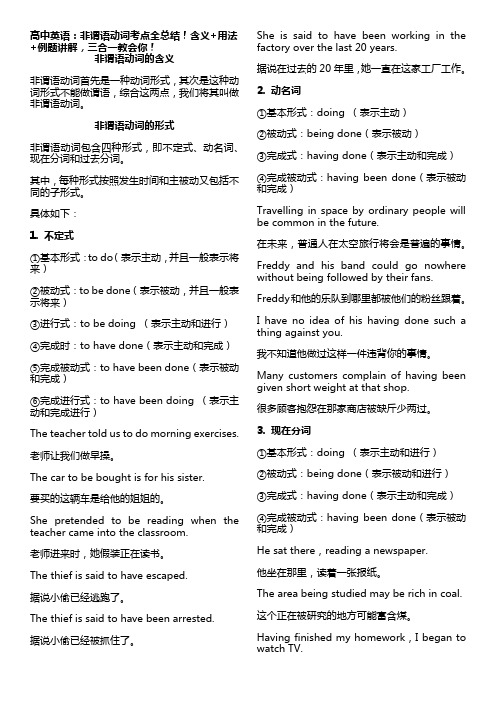
高中英语:非谓语动词考点全总结!含义+用法+例题讲解,三合一教会你!非谓语动词的含义非谓语动词首先是一种动词形式,其次是这种动词形式不能做谓语,综合这两点,我们将其叫做非谓语动词。
非谓语动词的形式非谓语动词包含四种形式,即不定式、动名词、现在分词和过去分词。
其中,每种形式按照发生时间和主被动又包括不同的子形式。
具体如下:1. 不定式①基本形式:to do(表示主动,并且一般表示将来)②被动式:to be done(表示被动,并且一般表示将来)③进行式:to be doing (表示主动和进行)④完成时:to have done(表示主动和完成)⑤完成被动式:to have been done(表示被动和完成)⑥完成进行式:to have been doing (表示主动和完成进行)The teacher told us to do morning exercises. 老师让我们做早操。
The car to be bought is for his sister.要买的这辆车是给他的姐姐的。
She pretended to be reading when the teacher came into the classroom.老师进来时,她假装正在读书。
The thief is said to have escaped.据说小偷已经逃跑了。
The thief is said to have been arrested.据说小偷已经被抓住了。
She is said to have been working in the factory over the last 20 years.据说在过去的20年里,她一直在这家工厂工作。
2. 动名词①基本形式:doing (表示主动)②被动式:being done(表示被动)③完成式:having done(表示主动和完成)④完成被动式:having been done(表示被动和完成)Travelling in space by ordinary people will be common in the future.在未来,普通人在太空旅行将会是普遍的事情。
高中英语语法专项精讲-非谓语动词讲解
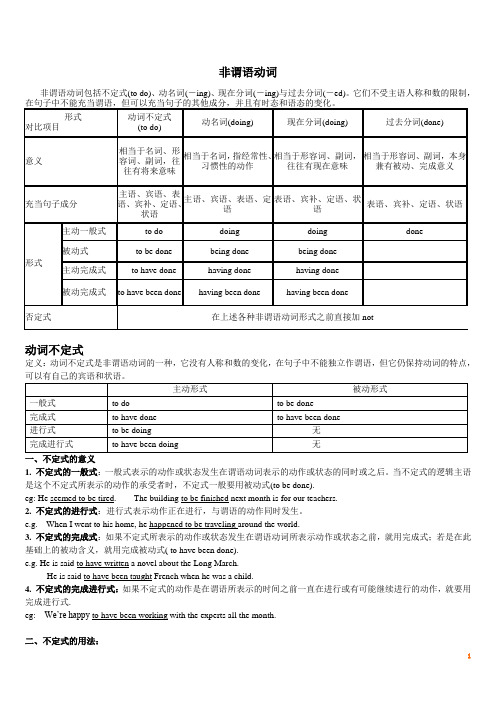
非谓语动词非谓语动词包括不定式(to do)、动名词(-ing)、现在分词(-ing)与过去分词(-ed)。
它们不受主语人称和数的限制,动词不定式定义:动词不定式是非谓语动词的一种,它没有人称和数的变化,在句子中不能独立作谓语,但它仍保持动词的特点,一、不定式的意义1. 不定式的一般式:一般式表示的动作或状态发生在谓语动词表示的动作或状态的同时或之后。
当不定式的逻辑主语是这个不定式所表示的动作的承受者时,不定式一般要用被动式(to be done).eg: He seemed to be tired. The building to be finished next month is for our teachers.2. 不定式的进行式:进行式表示动作正在进行,与谓语的动作同时发生。
e.g. When I went to his home, he happened to be traveling around the world.3. 不定式的完成式:如果不定式所表示的动作或状态发生在谓语动词所表示动作或状态之前,就用完成式;若是在此基础上的被动含义,就用完成被动式( to have been done).e.g. He is said to have written a novel about the Long March.He is said to have been taught French when he was a child.4. 不定式的完成进行式:如果不定式的动作是在谓语所表示的时间之前一直在进行或有可能继续进行的动作,就要用完成进行式.eg: We’re happy to have been working with the experts all the month.二、不定式的用法:1. 不定式做主语:不定式做主语一般表示具体的某次动作。
而动名词doing 表示习惯的,经常的动作。
高中英语-语法

5. 用在“with ”的复合结构中with sb./ sth. done.
1) With the matter _s_e_tt_le_d_ (settle), we all went home. 2) The murderer was brought in, with his hands tied (tie) behind his back.
1. The story is _s_u_r_p_r_is_i_n_g_(surprise).
v-ing,“令人...的”多用于修饰物
2. I am _su_r_p_r_i_s_e_d at the story. There was a _su__rp__ri_s_e_d_expression on her face when she heard the n We saw the store _r_o_b_b_e_d_by two men. • 我们目击了这家商店被两个歹徒抢劫。
• The beautiful girl had her 这个漂亮女孩昨 hair __cu__t _last night. 晚把头发剪了。
• 1. We saw the store robbed by two men. • 2. The beautiful girl had her hair cut
1) I looked up and noticed a snake winding
(wind) its way up the tree to catch its breakfast.
2) The missing boys were last seen _p_la_y_i_n_g_
(play) near the river.
= The girl __d_r_e_s_s_e_d__in__r_e_d___ is Kelly’s long-
(完整)高中英语语法之现在完成时

现在完成时讲解一、基本结构:主语+have/has+过去分词(done)①肯定句:主语+have/has+过去分词+其他②否定句:主语+have/has+not+过去分词+其他③一般疑问句:Have/Has+主语+过去分词+其他④特殊疑问句:特殊疑问词+一般疑问句(have/has+主语+过去分词+其他)二、用法1)现在完成时的"完成用法"现在完成时用来表示现在之前已发生过或完成的动作或状态,但其结果却和现在有联系,也就是说,动作或状态发生在过去但它的影响现在还存在.He has turned off the light.他已把灯关了。
(动作结束于过去,但说明的是现在的情况--灯现在不亮了。
)I have spent all of my money.(含义是:现在我没有钱花了.)Jane has laid the table.(含义是:现在桌子已经摆好了.)2)现在完成时的"未完成用法"指的是动作开始于过去某一时刻,一直延续到现在,或可能还要继续下去。
这里的动词要用持续性动词。
常与for (+时间段),since(+时间点)连用.Mary has been ill for three days.Mary has been ill since three days ago.注意:1.现在完成时不能单独与准确时间连用,(如表示过去的时间状语)如yesterday(morning、afternoon),last(morning、afternoon)等,除非与for, since连用.2.现在完成时往往同表示不确定的过去时间状语连用,如already(肯定), yet(否定,疑问), just, before, recently, still, latel y等:He has already obtained a scholarship.I haven't seen much of him recently (lately).We have seen that film before.Have they found the missing child yet ?3. 现在完成时常常与表示频度的时间状语连用,如ever, never, twice, several times等:Have you ever been to BeijingI have never heard Bunny say anything against her.I have used this pen only three times. It is still good.George has met that gentleman several times.4. 现在完成时还往往可以同包括现在时间在内的时间状语连用,如up to these few days/weeks/months/years, just, up to present(now), so far等:Peter has written six papers so far.Up to the present everything has been successful.5. 现在完成时还可以用来表示过去的一个时间到现在这段时间内重复发生的动作.We have had four texts this semester.6. have been to 和have gone to的区别have been to 强调“去过”,现已不在那里,如:He has been to the USA three times.他到美国去过三次。
牛津高中英语过去式过去分词表

rid ridden rung risen run said seen sought sold sent set sewn/sewed shaken shone shot shown shrunk shut sung sat slept slid smelled/smelt sown/sowed spoken sped/speeded spelled/spelt spent spun spit/spat spilt spread stood stolen stuck struck/stricken sworn swept swollen/swelled swum swung
take teach tear tell think throw understand undertake wake wear weep win wind withdraw write
带去 教 撕毁 告诉 认为 扔 理解 承担;从事 醒过来 穿 哭泣;流泪 赢 缠绕 撤回;收回 写
took taught tore told thought threw undrestood undertook woke wore wept won wound withdrew wrote
摆脱 骑车 按铃;响铃 上升;出现 跑步 说 看见 搜索;寻找 卖 送 放置 缝 震动 发光 射击 展示 收缩 关 唱歌 坐下 睡觉 滑动 闻起来 播种;散步 说 加速 拼写 花费 旋转 吐痰;吐 分离 传播 战立 偷 黏贴 罢工;打击;殴打 发誓 打扫 膨胀 游泳 摇摆
rid rode rang rose run said saw sought sold sent set sewed shook shone shot showed shrank/shrunk shut sang sat slept slid smelled/smelt sowed spoke sped/speeded spelled/spelt spent spun spit/spat spilt spread stood stole stuck struck swore swept swelled swam swung
高中英语过去分词做后置定语的用法精讲

a leaf fallen the sun risen the officer retired
Hale Waihona Puke done (vt.): done (vi). 做前置定语 表示被动 表示完成 做后置定语 表示被动
The injured workers = the workers who are injured
an honored guest = a guest who is honored
fall, rise, retire break, injure, honor
不及物动词 及物动词
done (vt.): 做前置定语 表示被动
We finished the run in less than half the time ___
A. to allow B. allowed C. allows D. allowing
Five people won the “China’s Green Figure” award, a title ___ to ordinary people for their contribution to the environmental protection.
A. is given B. being given C. given D. was given
• This will be the best novel of its kind ever written.
• = This will be the best novel of its kind that have been ever written.
动名词语法

非谓语动词在高中英语中,非谓语动词包括动词不定式(to do)、动名词(-ing)、现在分词(-ing)与过去分词(-ed)三种形式,它们有不少共同特点:①在句子中不能充当谓语,不受主语人称和数的限制;②保留部分动词特性:可以后接宾语,可用副词修饰;③否定形式,都是在其前面加上not/never等否定词;④表示的动作,如果明显发生的谓语动词表示的动作之前(或者强调先后),要求用完成时态形式;⑤都不能作地点状语,只有动词不定式可以作目的状语;⑥没有主语,其表示动作的执行者叫作“逻辑性主语”(主动语态时),有时表示动作的承受者(被动语态时)非谓语动词可充当句子的很多成分,并且有时态和语态的变化如下:II动词ing形式的要点一. 动名词的时态和语态1.动名词的时态用法:1)一般式当动名词表示的动作正好与谓动同时发生或晚于谓动发生时,用一般式;e.g. ① He enjoys listening to music.② They are looking forward to visiting the science museum.2)完成式当动名词表示的动作明显早于谓动发生或强调动作的先后时,用完成式;e.g. ① She regretted having broken the law at that time.② They couldn`t remember having helped you with handwriting.2.动名词的被动语态用法:1)当动名词的逻辑性主语正好是其表示动作的承受者时,一般用被动;e.g. ① The president tried to avoid being questioned by the reporters.② The little boy remembered being given some sweets for his good deeds. ※为了避免太过累赘,常用一般被动式替代完成被动式;2)动名词的主动式表被动意义的用法:在want, need, require,(物作主语时) be worth, be busy等词后,常用动名词的主动形式表示被动意义;e.g. ① These desks want painting this afternoon.= These desks want to be painted this afternoon.② There are lot of places worth visiting in this city.3.逻辑性主语:动名词的逻辑性主语通常用(形容词性)物主代词或名词所有格来充当,但当其为无生命体、抽象名词或不定代词时,则常用普通格形式;e.g. ① Do you mind my smoking here?② I remember Lucy`s coming to Hangzhou for the first time.③ They are looking forward to the lesson coming to an end early.二.动名词的功能1. 动名词作主语:动名词作主语,强调一般普遍性或抽象性动作,而不定式强调个别或某次具体的动作!e.g. ① Reading aloud is important in learning a language.② Playing football is my favorite sport.※常有一些句型,动名词短语放在后面,仍然作真正的主语:1)句型一: It is + adj. /n. + doing其中it为形式主语,动名词短语才是真正的主语,适用的名词或形容词还有:no use/good, a waste of time, a pity, a good pleasure, time, useless, foolish, crazy, funny, interesting, worthwhile, nice, terrible, etc.e.g. ① It is no use crying over the spilt time.② It is great fun playing with the big big wolf.③It nice working with you.2)句型二:There is no + doing相当于句型:It is impossible to do sth……e.g. ① There is no joking on this matter.② There is no saying what may happen tomorrow.2. 动名词作宾语:1)主语+ 谓语+ doinge.g. ① When we got home, mum had finished cooking the supper yesterday.② Can you imagine floating on the sea for thirty days?※※要求只接动名词作宾语的动词还有:permit, admit, allow, forbid, ban, finish, complete, appreciate, avoid, bear, celebrate, delay, enjoy, escape, explain, include, keep, forgive, mention, practice, prevent, resist, suggest, postpone(推迟),consider(考虑), can`t help(禁不住), insist on, depend on, mean(打算), try(尝试) etc.2)句型结构:i). do+限定词(my, some, any, the等)+doing,表示“做……事”之意do some cleaning打扫卫生 do some shopping购物e.g. ① She likes doing some shopping on the weekend.ii). 用在worth, busy等形容词后面作宾语, 相当于固定搭配:e.g. ① This book is well worth reading.② The students are busy preparing for the final examination.iii). 主语 + have trouble/difficulty/a problem/a good time (in) doing 有困难/开心做…e.g. ① They had great difficulty finding the hotel.② He had a great time playing with the little dog.iv). 主语 + spend + time/money + doing 花时间或金钱做…e.g. ① They spent a lot of money collecting all the stamps.②The students always spend much time preparing for the final examination.v). 主语 + lose no time (in) + doing 立即做…e.g. ① They lost no time telling the teacher the good news.② The boy lost no time eating the nice delicious food as he was hungry too long.※在介词之后,通常用动名词作宾语,这是一个绝对概念;3)形式宾语用it作形式宾语,而真正的宾语则用动名词短语放在宾补之后;主语 + think/consider/find/feel like + it + useless/no use/no good + doinge.g. ① They found it useless explaining it to the big man.② The boy considered it no good arguing with his manager then.3 动名词作表语:动名词作表语, 表示对主语的解释说明, 可以和主语互换位置而整句意义不变;e.g. ① Her job is washing and cooking.② His favorite sport is playing basketball.4动名词作定语:动名词作定语, 表示被修饰词的功能用途, 使用范围等;e.g. ① This is a nice washing machine.② He has bought a new writing table.※动名词所修饰的名词(短语)不能充当其逻辑主语;。
高中英语非谓语动词 done
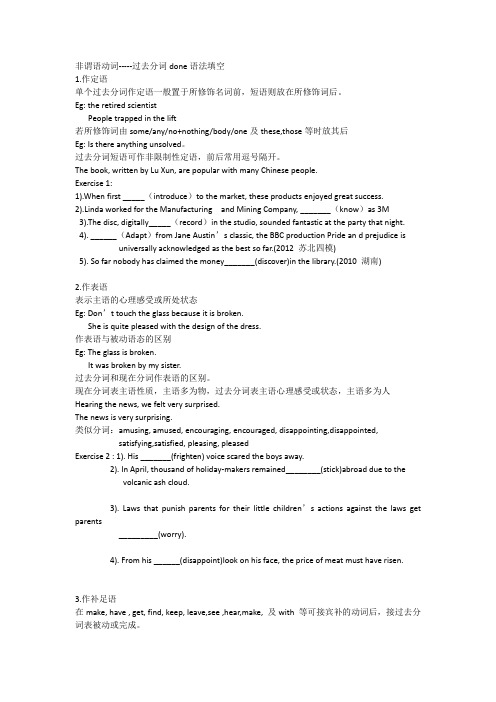
非谓语动词-----过去分词done语法填空1.作定语单个过去分词作定语一般置于所修饰名词前,短语则放在所修饰词后。
Eg: the retired scientistPeople trapped in the lift若所修饰词由some/any/no+nothing/body/one及these,those等时放其后Eg: Is there anything unsolved。
过去分词短语可作非限制性定语,前后常用逗号隔开。
The book, written by Lu Xun, are popular with many Chinese people.Exercise 1:1).When first _____(introduce)to the market, these products enjoyed great success.2).Linda worked for the Manufacturing and Mining Company, _______(know)as 3M3).The disc, digitally_____(record)in the studio, sounded fantastic at the party that night.4). ______(Adapt)from Jane Austin’s classic, the BBC production Pride an d prejudice isuniversally acknowledged as the best so far.(2012 苏北四模)5). So far nobody has claimed the money_______(discover)in the library.(2010 湖南)2.作表语表示主语的心理感受或所处状态Eg: Don’t touch the glass because it is broken.She is quite pleased with the design of the dress.作表语与被动语态的区别Eg: The glass is broken.It was broken by my sister.过去分词和现在分词作表语的区别。
高中英语语法之现在完成时

现在完成时讲解一、基本结构:主语+have/has+过去分词(done)①肯定句:主语+have/has+过去分词+其他②否定句:主语+have/has+not+过去分词+其他③一般疑问句:Have/Has+主语+过去分词+其他④特殊疑问句:特殊疑问词+一般疑问句(have/has+主语+过去分词+其他)二、用法1)现在完成时的"完成用法"现在完成时用来表示现在之前已发生过或完成的动作或状态,但其结果却和现在有联系,也就是说,动作或状态发生在过去但它的影响现在还存在.He has turned off the light.他已把灯关了。
(动作结束于过去,但说明的是现在的情况--灯现在不亮了。
)I have spent all of my money.(含义是:现在我没有钱花了.)Jane has laid the table.(含义是:现在桌子已经摆好了.)2)现在完成时的"未完成用法"指的是动作开始于过去某一时刻,一直延续到现在,或可能还要继续下去。
这里的动词要用持续性动词。
常与for (+时间段),since(+时间点)连用.Mary has been ill for three days.Mary has been ill since three days ago.注意:1.现在完成时不能单独与准确时间连用,(如表示过去的时间状语)如yesterday(morning、afternoon),last(morning、afternoon)等,除非与for, since连用.2.现在完成时往往同表示不确定的过去时间状语连用,如already(肯定), yet(否定,疑问), just, before, recently, still, latel y等:He has already obtained a scholarship.I haven't seen much of him recently (lately).We have seen that film before.Have they found the missing child yet ?3. 现在完成时常常与表示频度的时间状语连用,如ever, never, twice, several times等:Have you ever been to BeijingI have never heard Bunny say anything against her.I have used this pen only three times. It is still good.George has met that gentleman several times.4. 现在完成时还往往可以同包括现在时间在内的时间状语连用,如up to these few days/weeks/months/years, just, up to present(now), so far等:Peter has written six papers so far.Up to the present everything has been successful.5. 现在完成时还可以用来表示过去的一个时间到现在这段时间内重复发生的动作.We have had four texts this semester.6. have been to 和have gone to的区别have been to 强调“去过”,现已不在那里,如:He has been to the USA three times.他到美国去过三次。
done作主语
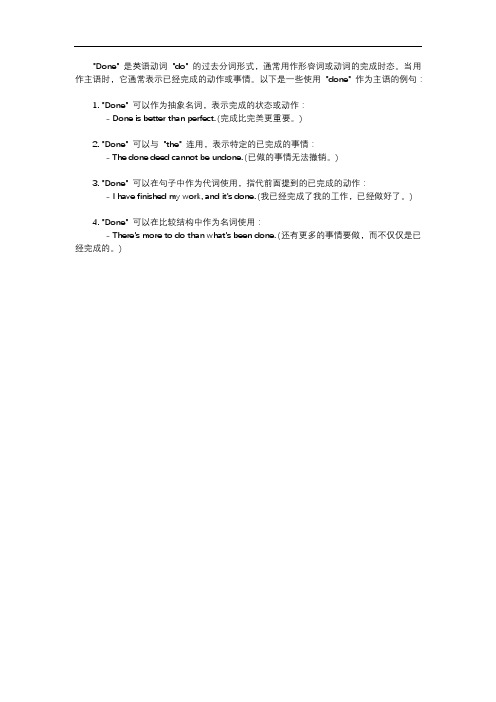
"Done" 是英语动词"do" 的过去分词形式,通常用作形容词或动词的完成时态。
当用作主语时,它通常表示已经完成的动作或事情。
以下是一些使用"done" 作为主语的例句:
1. "Done" 可以作为抽象名词,表示完成的状态或动作:
- Done is better than perfect. (完成比完美更重要。
)
2. "Done" 可以与"the" 连用,表示特定的已完成的事情:
- The done deed cannot be undone. (已做的事情无法撤销。
)
3. "Done" 可以在句子中作为代词使用,指代前面提到的已完成的动作:
- I have finished my work, and it's done. (我已经完成了我的工作,已经做好了。
)
4. "Done" 可以在比较结构中作为名词使用:
- There's more to do than what's been done. (还有更多的事情要做,而不仅仅是已经完成的。
)。
英语语法——过去分词作定语和表语

Past Participle
—— 过去分词(v+ed) 表被动/完成 及物动词vt.:被动+完成——polluted river 不及物动词vi.:完成——fallen leaves
过去分词作定语和表语
The Past Participle as Attribute and Predicative
基本句式
基本句式
主谓 I cry/run. 主谓宾 I play basketball.
句子必定有谓语
一个句子一个谓语
主系表 I am a student.
She asks me a question., stands in front of me.
P.P as Attribute
Exercise
把句子转化成定语从句: (1) It came from the river polluted by the dirty water from London. It came from the river which was polluted by the dirty water from London. (2) Zhong Nanshan awarded Medal of the Republic on September 8th did great contribution in the fight with Covid-19. Zhong Nanshan who was awarded Medal of the Republic on September 8th did great contribution in the fight with Covid-19.
高中英语语法:非谓语动词总结-大全
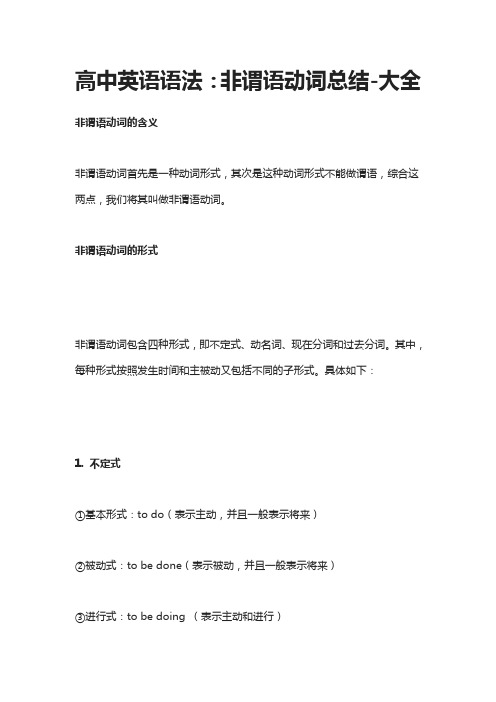
高中英语语法:非谓语动词总结-大全非谓语动词的含义非谓语动词首先是一种动词形式,其次是这种动词形式不能做谓语,综合这两点,我们将其叫做非谓语动词。
非谓语动词的形式非谓语动词包含四种形式,即不定式、动名词、现在分词和过去分词。
其中,每种形式按照发生时间和主被动又包括不同的子形式。
具体如下:1. 不定式①基本形式:to do(表示主动,并且一般表示将来)②被动式:to be done(表示被动,并且一般表示将来)③进行式:to be doing (表示主动和进行)④完成时:to have done(表示主动和完成)⑤完成被动式:to have been done(表示被动和完成)⑥完成进行式:to have been doing (表示主动和完成进行)The teacher told us to do morning exercises. 老师让我们做早操。
The car to be bought is for his sister. 要买的这辆车是给他的姐姐的。
She pretended to be reading when the teacher came into the classroom. 老师进来时,她假装正在读书。
The thief is said to have escaped. 据说小偷已经逃跑了。
The thief is said to have been arrested. 据说小偷已经被抓住了。
She is said to have been working in the factory over the last 20 years. 据说在过去的20年里,她一直在这家工厂工作。
2. 动名词①基本形式:doing (表示主动)②被动式:being done(表示被动)③完成式:having done(表示主动和完成)④完成被动式:having been done(表示被动和完成)Travelling in space by ordinary people will be common in the future. 在未来,普通人在太空旅行将会是普遍的事情。
- 1、下载文档前请自行甄别文档内容的完整性,平台不提供额外的编辑、内容补充、找答案等附加服务。
- 2、"仅部分预览"的文档,不可在线预览部分如存在完整性等问题,可反馈申请退款(可完整预览的文档不适用该条件!)。
- 3、如文档侵犯您的权益,请联系客服反馈,我们会尽快为您处理(人工客服工作时间:9:00-18:30)。
③表条件,相当于一个条件状语从句,有时过去分 词前可用if等词。
• ____G_iv_e_n_(give) another chance, he will do better.
• • If __h_e_at_e_d(heat), water can be turned
into steam.
• Once___b_e_g_u_n__(begin), the plan can’t be stopped.
• 3.只用done形式情况: be lost in/be faced with/be seated/ be devoted to…
• __F_a_c_e_d_____with danger, he kept calm.( face)
• 4.只用doing形式的情况: tasting../dating from/ consis分词一方面具有 动__词__的性质,另一 方面也相当于_形_容__词__和_ 副词
在句中可以作定___语 a warn chair _表_语____语be broken 状__语___H_e_ is hidden behind the door, frightened _补__语__H__e_got his essay written/have hair cut • 可以表示时间、原因、条件、让步、
• If I was given one more hour, I would have done it better.
Given one more hour, I would have done it better.
过去分词 done
done指分词与主句主语是被动关系 _S__ee_n__from the hill, the city is charming. doing指分词与主句主语是主动关系 _s_e_ei_n_g_ from the hill, you can get a good view.
• T_a_s_t_in_g____good, the food sells well. • The custom__d_a_ti_n_g__from 2000 years ago
is out of date.
• 5 如果过去分词的逻辑主语和句子主语不一 致,必须使用过去分词的独立主格结构。
• Weather _p_e_r_m__it_ti_n_g__, I’ll go hiking. • Everything_t_a_k_e_n____(take) into
• 7.分词相当于一个从句,主句前不能再加任何连 词.
• 改错: Warned many times, but he came late again.
• It being Sunday, so we stay at home.
注意事项
• 1.Doing指主动或进行/Done指被动或完成
• 2.做状语时done=having been done, 做定语时 只用done
• ___W_r_i_tt_e_n_____ in a hurry, this article was not so good!
• I like reading books__w_r_it_t_e_n__( write) by Lunxun.
②表原因,相当于一个原因状语从句。
• M_o_v_e_d___(move) by the story, the excited people stopped quarrelling with each other.
• Enc_o_u_r_ag_e_d(encourage) by the speech, the young people made up their minds to take up the struggle.
分词是从句的简化
• While you’re crossing the road, you can’t be too careful. Crossing the road, you can’t be too careful.
• When he was asked why he was late, he kept silent. Asked why he was late, he kept calm.
• 2.His father died,__le_a_v_i_n_g_him amounts of (leave)heritage.
• 3.He won the first,__m_a_k_i_n_g_him famous.(make • 4.He hurried to the station,
• only_t_o_b_e__to_l_d_(tell) the train had been away for 5 minutes.
④表让步,相当于一个 though/although引导的让步状语从句
• __E_x_h_a_u_st_e_d(exhaust) by the running,
they went on running after the robber.
⑤表方式或伴随情况。
• _s_u_p_p_o_rt_e(dsupport) by his son, the old man stood up.
consideration, the plan is perfect.
• 6.分词的否定是在前面直接加not.
• N__o_t_s_a_t_is(fnieodt satisfy), he kept in silence.
• N_o_t__h_a_v_in_g__fi_n_i(shneodt finish) his homework, he was not allowed to go out.
方式或伴随情况等。
①表时间,相当于一个时间状语从句,有时 过去分词前可加连词when或while做强调
• (When he was)__a_s_k_e_d__(ask) why he
was late, he kept silence.
• (While he was)__w_a_l_k_in_g(walk) through the forest, he got lost.
• _S_e_a_t_ed___(seat) at the table, my father and I were talking about my job.
6.表结果:done表状态, doing表自然而然的结果 only to do表意料不到的结果
• 1. He got home, _E_x_h_a_u_s_t.ed
• Because he was ill, he didn’t come today. Being ill, he didn’t come today.
• Though he has been told many times, he still can’t remember my number. Having been told many times, he still can’t …
